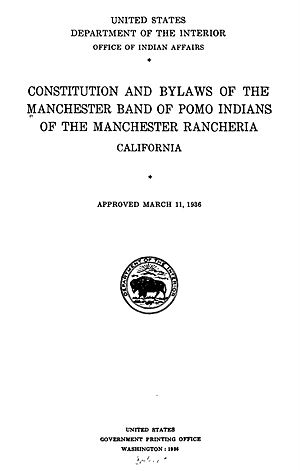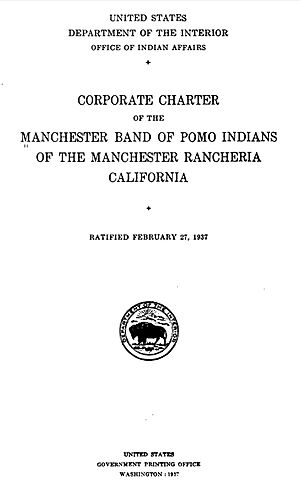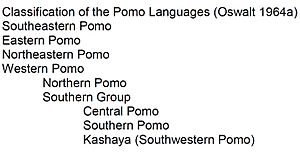Manchester Band of Pomo Indians of the Manchester Rancheria facts for kids
| Total population | |
|---|---|
| 800+ actively enrolled Members, Estimated at 1300 |
|
| Regions with significant populations | |
| Manchester-Point Arena, Northern California, United States. | |
| Languages | |
| English, Central Pomo languages (Hokan phylum) | |
| Related ethnic groups | |
| Pomo tribes |
The Manchester Band of Pomo Indians of the Manchester Rancheria is a federally recognized tribe of Pomo Native Americans in California. This means the United States government officially recognizes them as a sovereign nation. The tribe is a community of Pomo people who have lived in Northern California for a very long time. The Bokeya people, who are part of the Pomo, officially joined the Manchester Band when their constitution and by-laws were approved in 1936.
Contents
The Tribe's Land: The Rancheria
The tribe lives on land called a "rancheria," which is like their own special territory. It's split into two main areas: Manchester and Point Arena in Mendocino County, California. The Bokeya were once the largest Pomo group in terms of the land they used. A long time ago, a bridge connected these two parts of their land. Today, their rancheria is about 364 acres (1.47 square kilometers) big.
How the Tribe is Governed: Their Constitution
The Manchester Band of Pomo Indians is one of the few Native American tribes that has a written Constitution available for everyone to see. After the Indian Reorganization Act (IRA) was passed in 1934, the Bokeya people created their Constitution and By-Laws. This important document gave them power over their rancheria land. It helped them set up a legal organization and gain certain rights and powers offered to Native Americans by the IRA.
The Constitution has five main parts, called articles:
- ARTICLE I—TERRITORY: This part explains that the Manchester Band of Pomo Indians has authority over the Manchester Rancheria and any lands added to it.
- ARTICLE II—MEMBERSHIP: This section describes who can be a member of the tribe. It includes people listed on the official census from April 1, 1935, and children born to members who live on the Rancheria. It also says the community council can make rules for future membership.
- ARTICLE III—GOVERNING BODY: This article explains how the tribe is governed. The main governing group is the community council, made up of all qualified voters in the band. They elect leaders like a chairman, vice chairman, secretary, and treasurer. The council meets regularly, and special meetings can be called by the chairman or a certain number of voters.
- ARTICLE IV—POWERS OF THE COMMUNITY COUNCIL: This part lists the powers of the community council. They can talk with federal, state, and local governments, hire lawyers, and say "no" to selling or leasing tribal lands. They also manage the tribe's money and businesses, create and enforce rules, and can set up other organizations for economic purposes.
- ARTICLE V—AMENDMENTS: This section explains how the Constitution and By-laws can be changed. It requires a majority vote of the qualified voters in the band during a special election.
The Tribe's Business Plan: Corporate Charter
The tribe also has a Corporate Charter. This document was created to help the Manchester Band of Pomo Indians grow their economy. For changes to this charter to be approved, most adult tribal members living on the Rancheria must vote for it, and at least 30 percent of eligible voters must participate.
Here are some key points from the Corporate Charter:
- Corporate Existence and Purposes: The charter helps the tribe's economic growth.
- Perpetual Succession Membership: The Manchester Band of Pomo Indians will continue to exist as a federal corporation forever. All current and future members of the Band are members of this corporation.
- Management: The Manchester Community Council, which is set up by the tribe's Constitution, handles all the business powers.
- Corporate Powers: The Band can do many things, like use a corporate seal, buy or receive property, and manage its assets.
- Corporate Accounts: The tribe's officers must keep clear and public records of the tribe's money. They also provide an annual financial report to the Commissioner of Indian Affairs.
Pomo Language
The Central Pomo people are known for their unique dialect, which is part of the larger Pomoan language family. This language family belongs to the Hokan group. Before Europeans arrived, it's believed that around 8,000 people spoke Pomoan languages. Today, there are still some speakers of Central Pomo.
Culture and Traditions
Since the Manchester Band is part of the larger Pomo people, their cultural practices are similar to other Pomo groups.
- Community Life: Each Bokeya family group had a special meeting house for men. Here, they performed "ghost ceremonies" which were important for bringing the community together.
- Important Roles: Jobs like hunting, fishing, and healing were highly respected. Shamans, who were spiritual healers, helped cure individual sickness and problems in the community.
- Self-Sufficiency: The tribe was able to support itself using resources from the ocean, rivers, and forests. They had strict rules about using these resources and were careful about outsiders using them. They were open to sharing but insisted on proper protocols.
- Trade and Feasts: They had a well-organized system for trading goods. When they had more than enough resources, they would hold feasts with their trading partners.
- Beliefs: They strongly believed in "dreamers" and their dreams, which guided their religion and ceremonies. Ceremonies were held in a special dance house. Dream songs were used to help heal people and the community.
After contact with settlers, the Bokeya people continued some traditional ways of life but also adapted. They farmed land and grew crops to sell. They also charged fees for people to fish on their rancheria and worked in logging and road construction. After the IRA, they received a loan to start a ranch, but it faced problems and didn't succeed. Despite this, they continued to practice some of their "ceremonial festivities and curing practices."
Casino
The Manchester Band of Pomo Indians has its own casino called the Garcia River Casino. It is located on the Point Arena Rancheria. The casino is small and mainly has slot machines, though it does have one electronic blackjack table. A gaming agency oversees the legal aspects of the casino.
Healthcare
Healthcare for the tribe is provided by a local clinic that is part of the Sonoma County Indian Health Project. Their mission is: "To continually improve and maintain a comprehensive healthcare system to serve the needs and traditional values of our American Indian Community."
 | Madam C. J. Walker |
 | Janet Emerson Bashen |
 | Annie Turnbo Malone |
 | Maggie L. Walker |




